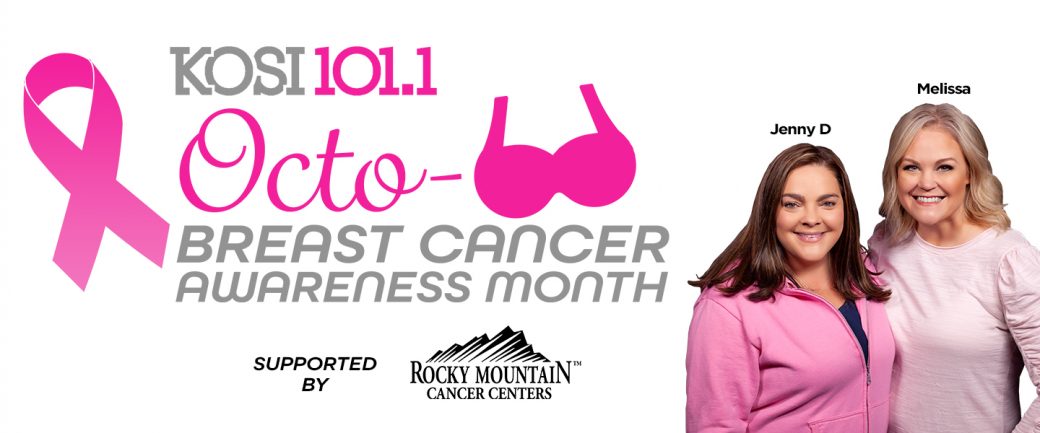KOSI 101.1’s OctoBRA
There are no words. No words to say to a friend who has been diagnosed with breast cancer. Except “I’m so sorry” and “I will be here for you.” It happens to people and loved ones every day. We want to make sure that we can also say to our friends and loved ones “you did it!!” “You BEAT cancer and are our hero and survivor!” KOSI 101.1’s Melissa, Murphy and I wanted to spread awareness and resources for our friends that are going thru the battle right now. Early detection is the best way to help your friends and loved ones. So be your own advocate and join us in spreading breast cancer awareness through KOSI 101.1’s “OctoBRA” supported by Rocky Mountain Cancer Centers (RMCC). Together we are always stronger!! XO Jenny D.
We also realize that some women will be diagnosed with metastatic breast cancer (MBC) and need to fight the cancer for the rest of their lives. For you, we recognize your journey and stand with you in the fight for a cure.
Are you or a loved one recently diagnosed with breast cancer? Download Rocky Mountain Cancer Center’s guide to find helpful tips and information about what steps you should take next. Choose RMCC and you’re choosing an entire team of breast cancer specialists of doctors, nurses and treatment professionals with one focus – a relentless dedication to you. We provide patients with the most advanced, nationally-vetted treatments available and access to more clinical trials than any other facility in the state. It’s no wonder we treat over 80% of all breast cancer patients in Colorado.
Early Detection
Early detection is key in the treatment of breast cancer. While some women experience symptoms of breast cancer, many others experience no symptoms at all. This is why regular screening is so important. The earlier breast cancer is detected, the easier it is to treat successfully. Women in their early 40s have the option to start screening with a mammogram every year. Women ages 45-54 should have mammograms every year.
Breast self-exam, or regularly examining your breasts on your own, can be an important way to find breast cancer early, when it’s more likely to be treated successfully. A breast self-exam in combination with other screening methods can increase the odds of early detection.
Women are at a higher risk of developing breast cancer. In fact, 1 in 8 American women are estimated to develop breast cancer during their lifetimes. You can take charge of your health by making sure to have regular breast cancer screenings. If you do develop the disease, the earlier it’s detected, the better the likelihood of a positive outcome.
Click here for breast cancer FAQs.
Why do you need a mammogram?
Mammograms don’t prevent breast cancer, but they can often find or detect breast cancer early, even before you can feel a lump. Mammograms can also show tiny clusters of calcium called micro-calcifications. It’s important to understand that mammograms aren’t perfect. Early breast cancer can be hidden within normal breast tissue resulting in a false negative. Sometimes a mammogram may reveal something that could be of concern that isn’t cancerous. Which is considered a false positive. And, there are also times there are abnormalities or benign conditions found in the breast.
What support is available for breast cancer patients?
RMCC has social workers available to patients who will host support meetings. Your care team will also provide resources for the support you and your family need, including educational events and support groups both inside and outside the community. You may even have access to a nutritionist who will help guide you in making healthy lifestyle choices during and after your treatment.
Click here for patient resources: Support groups, advance care planning, what to expect at your first appointment, a guide to cancer terms and more.
Rocky Mountain Cancer Centers also partners with some of the best cancer awareness organizations and foundations in Colorado, who are promoting cancer care support, awareness, and survivorship services.
Click here for a list of affiliates.
Breast Cancer Risk Factors and Prevention Methods
There are a variety of factors that can increase your risk of breast cancer. While most of these risk factors can’t be controlled, factors that involve personal lifestyle choices can be changed. Below are some common risk factors and suggestions for lowering your risk in areas where possible:
- Age. If you are over the age of 55 you have the highest risk of developing invasive breast cancer.
- Family history of breast cancer. If any women in your immediate family have been diagnosed with breast cancer you may consider learning more about genetic testing that can be done to determine if you are at a higher risk of developing breast cancer.
- Birth control. Oral contraceptives have been linked to a slightly higher risk of developing breast cancer. To reduce this risk, consider other forms of contraception (such as IUD or condoms).
- Dense breast tissue. If you have dense breasts, it can be harder to detect cancer on a mammogram.
- Weight. Excess body fat is associated with increased blood insulin levels and increased estrogen levels in women — both of which have been associated with breast cancer. If you’re overweight, work to change that by eating reasonable portions of healthy foods and increasing your physical activity. Talk with your doctor about what is a good plan for you.
- Alcohol consumption. The more alcohol you drink, the higher your risk of developing breast cancer. To reduce your risk, the American Cancer Society recommends consuming a maximum of one alcoholic beverage per day (For women: 12 ounces of beer, 5 ounces of wine, or 1.5 ounces of liquor).
- Inherited gene mutations. Mutated versions of certain genes can lead to abnormal cell growth, which can lead to breast cancer (and possibly other cancers).
Knowing you’re at heightened risk is beneficial regardless of whether you possess many risk factors or only one. Fortunately, you can take charge of your health by making sure to have regular breast cancer screenings. If you do develop the disease, the earlier it’s detected, the better the likelihood of a positive outcome.
Rocky Mountain Cancer Centers (RMCC) know that every breast cancer diagnosis is unique… just like every patient. RMCC is here to help you through every step of the way, from choosing the right cancer specialist and treatment plan to your ongoing care as a cancer survivor. Find the right breast cancer specialist for you, located close to your home throughout Colorado.
Thanks to our partners of KOSI 101.1’s OctoBRA Breast Cancer Awareness Month:


